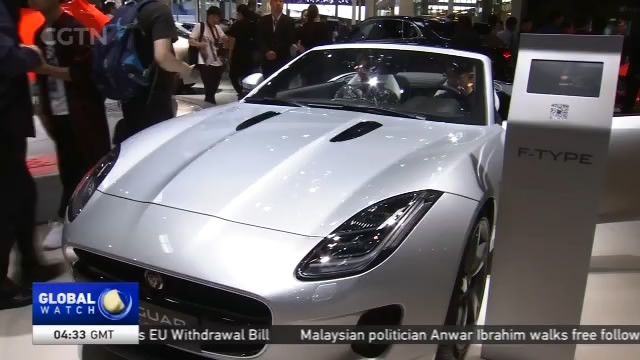
13:24, 16-May-2018
Beijing Auto Show 2018: More open auto market to accelerate competition
04:00

China pledges to keep opening up. Automobile tariffs are set to be cut soon. So what does this mean for competition in China's auto market? Xia Cheng has more details.
"In China, for China", a catch phrase among auto executives at the Beijing autoshow. And with policies for wider access, there will be "more in China, for more of China". When full ownership is no longer a no-go, the question is whether to go solo or expand partnerships.
PETER FLEET ASIA-PACIFIC PRESIDENT, FORD MOTOR COMPANY "We already have strong 2 JVs, 3rd with Zhongtai for a new range of battery electrical vehicles renewing digital span."
Wider market access means more competition--for example, the new breed of automakers claiming their internet mindset helps capture the digital generation.
XIA CHENG BEIJING "Tesla--everyone's benchmark is here. It is expected to set up a fully owned China factory, as the country opens up its auto sector-- that is, if Tesla can get over the current cash flow and supply snags."
Those are not top concerns for traditional automakers--they don't rely on rounds of funding from venture capitalists, and their long-term operation has built up strong supply chains. They are more pressured on winning the tech race. Jaguar Land Rover is teaming up with 5 Chinese companies in fields like telecom, mapping, autonomous driving.
RALF SPETH, CEO JAGUAR LAND ROVER "It means we have to bring with all parties together at the very moment, safety needs all parties involve, that means government and infrastructure to helps to make next further steps."
And Alibaba plays a role in Ford's plan to reverse declining sales in China.
PETER FLEET ASIA-PACIFIC PRESIDENT, FORD MOTOR COMPANY "Yes, our sales off a little bit, some of our cars approach end of their cycle, huge wave of new exciting props, we bringing new features to market to another cars with association with Alibaba, we've gone public about ambition to gain revenues base by 15% by 2025."
But not all automakers would move in the direction of getting more JVs on board.
DOUG BETTS , SENIOR VP GLOBAL AUTOMOTIVE OPERATIONS, J.D. POWER "I think honestly, foreign automakers didn't need the support of local partners for understanding the domestic market, setting dealers dealing with governments so whether the foreign makers learn how to do it themselves or if it's worthwhile, I don't know, it's depend on themselves to decide."
As for premium brands selling only imported cars in China, the upcoming tariff cut is welcome move for dealers -- who may not have to pass on the savings to consumers because demand is so strong.
KIM AIREY, MANAGING DIRECTOR CHINESE MAINLAND, HONG KONG & MACAO, BENTLEY "The reduction intact comes through and the...it's good news I think for everyone, and it should have impact on prices that will go through to the market, and should be a test for us."
FRANCESCO SCARDAONI, MANAGING DIRECTOR CHINESE MAINLAND, HONG KONG & MACAO, LAMBORGHINI "To me, it's amazing to see, on the other side, the government so there is no more need to create this gap for."
For now, auto imports and exports are only a fraction of total sales, auto executives do not see material impact from the China-US trade tensions. The pressure on Chinese own auto brands is real--but if competition drives better quality of products, and diversity gets consumers' adrenaline running, a more mature China auto market would move to the inside track of mobility.
XIA CHENG, CGTN, BEIJING.

SITEMAP
Copyright © 2018 CGTN. Beijing ICP prepared NO.16065310-3
Copyright © 2018 CGTN. Beijing ICP prepared NO.16065310-3